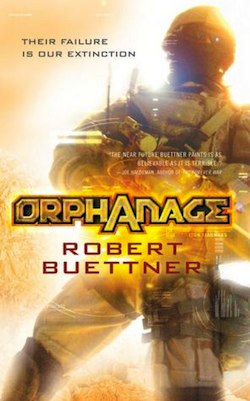War is a tough thing to tell a story about. Like all extreme scenarios, it tends towards polarization. It’s either a glorious affair of flashing sabers and burnished medals a la Alexander Nevsky or it’s a meat grinder that chews up promising young men and turns them into shrieking red mist long before they can realize their potential (Platoon, All’s Quiet on the Western Front). Warfighters are either steel-eyed heroes (The Illiad) or adolescent killers (Generation Kill).
The tough truth? Wars are both glorious and horrible. The men and women who fight them are both heroes and villains, frequently at the same time. Military science fiction struggles just as mightily as literary fiction to wrap its arms around the complexity of what motivates people to step into what is arguably the most harrowing crucible a human can experience.
With Orphanage, Robert Buettner addressed war and the warrior’s complexity with a frank honesty that I’d never seen in speculative fiction before. Buettner claimed to be eschewing politics in an effort to be simply “pro foot-soldier,” but I think he was actually selling himself short. Buettner saw with a veteran’s instinct the fracturing a personality undergoes under the rigors of battle. The resultant person is often many contradictory things at once, much like we all are, but amplified by the condensed and explosive nature of life in a combat zone. Buettner’s protagonist, Jason Wander, was joined by a full cast of such fully realized characters; Metzger, Munchkin, Klein and even Jeeb, the “robot cockroach” reconnaissance drone that played an instrumental role in humanity’s victory over an alien and implacable enemy. It is in these pressure-cooked contradictions of character that Buettner finds his voice, one that rings absolutely authentic with folks who have “been in the suck,” and is the real reason why Orphanage is one of the great works of modern military science fiction.
Orphanage is the story of Jason Wander, a screw up kid who is coming of age just as “the slugs,” a protean alien race bent on our destruction, begin launching a series of planet-sized projectiles at earth, wiping out much of our civilization in short order. Wander joins the ranks of legions of orphans who lost their families in that barrage in a desperate, last-bid effort to bring the fight to the enemy and save humanity.
There’s that great expression – men and women don’t fight for flags or ideology. They fight for the person next to them. It’s totally true. What’s also true is that they fight because they’re insecure about their masculinity, or that they’re hopped up on cocaine, or because they want free college tuition, or they’re trying to piss off their mom, or make their dad proud, or because they’re blood-addled sociopaths who would be serial killers if they weren’t in the military. Some of them may be fighting for several of those reasons all at once. It is that inherent contradiction that is often lost when folks who’ve never “been forward” try their hand at relating a tale about those who’ve been in it.
But Buettner’s been forward, and you can tell. Jason Wander is every bit as multi-faceted as anyone I ever met in Iraq. Through his loss of his parents to his slide into juvenile delinquency, his incompetence (resulting in the death of a comrade), through his reluctant soldiering and final transformation into first a fighter, and finally a leader who could ultimately save the human race, he encompasses all the facets you see in field conditions. Wander is a drug addict, a bully, a malcontent, a horndog, a master tactician and a genuinely decent human being.
Buettner has Wander marshalling a range of reasons to propel himself into the horror of reshaping himself for war, and finally into the horror of war itself. He wants to avenge his family, protect the human race and burns with a desire to reinvent himself as person who earns his air. But Buettner also addresses the reasons that are missing from lesser works of military science fiction. Wander, like most warfighters, is young. He burns with the self-interested passion of young people – newly introduced to rapidly developing appetites. He wants to feed those appetites, and live long enough to do so, this as much as his nobler attributes, guides the hand of a hero.
Which is how it goes. Age develops first the awareness of others, and finally compassion for them. When that awareness develops among people, armed and in the largely lawless and unsupervised environment where war happens (and, yes, where training for war happens), you get some interesting results. Buettner put those on parade in a refreshing way.
A lot of writers try to show military life “warts and all,” but the enduring problem is that they are normally guessing at what those warts really look like. The protagonists go off to fight a powerful and advanced alien race armed with Vietnam era technology in a nod to the informal motto of every hard-bitten unit in all 5 branches: We do more with less. That’s just the tip of the iceberg Buettner touches just enough to let you know that he’s been there: long, pointless waiting. Mountains of paperwork. A bureaucracy more than happy to steamroll real people as it adheres mindlessly to process.
With Orphanage, Buettner showed that he gets it. While I can’t ever prove it, I suspect that he does so subconsciously, with the natural ease of a person for whom this stuff is thematic. Humanity has, to date, not had to go up against a race of slug like aliens bent on our wholesale destruction. Inshallah, we never will.
But if we ever do? I’m willing to bet my own years in uniform that Orphanage is precisely what it’ll look like.
Myke Cole is the author of the military fantasy Shadow Ops series. The first novel, Control Point, is coming from Ace in February 2012.










